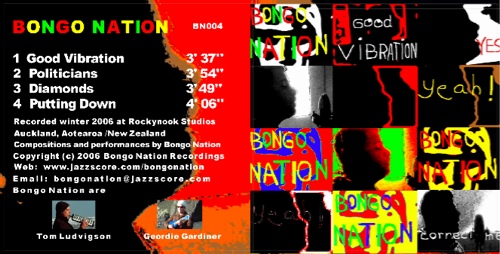Auckland reggae duo Bongo Nation produced their own recordings, music videos and Web presence using off-the-shelf Mac laptop computers and software off the Web.
Early ideas for the Bongo Nation repertoire grew out of close listening to classic roots reggae and dub masters, focusing in particular on hand percussion and bass riddims.
The recordings for our EP “Good Vibration” were made in our home studio on an Apple iBook G4 running Ableton Live5 music production software. We used an M-Audio Ozone USB digital audio interface to plug in a Shure KSM27 studio microphone or electric instruments like a Fender Squire Jazz bass or the old Yamaha YC20 organ. Dub effects and vocal processing were all done in Live5. When mixing and mastering we also made good use of a VST plug-in compressor called the “Vintage Warmer” from PSP Software.
Mastering the “Good Vibration” EP was an iterative process guided by trial and error. We used the Apple iTunes software that comes with the laptops to burn our new mixes to CD so that we could listen to them on other equipment and compare them to tracks that we were familiar with. We kept tweaking the mixes, burning them to CD and playing the tracks on the car stereo until they sounded right.
We also used the iTunes software on the laptop to burn the final mixes of the four “Good Vibration” EP tracks on to blank all-white CDs. We then printed the CD artwork made with the Discus software straight onto the white CDs using an Epson Stylus Photo R210 USB colour printer.
Artwork for CD case inserts and printing on the CDs was developed using an inexpensive software package called Discus. With this we brought together a collage of still frames from the “Good Vibration” video with EP track names and Bongo Nation contact information, and then used a Brother DCP-110C USB colour printer to print CD inserts on glossy photographic paper straight from the laptop:

Original footage for the two Bongo Nation videos “good Vibration” and “Diamonds” was filmed with a JVC Everio Hard Drive Camcorder. The EVERIO has a built-in 35 GB hard-drive: you connect it to the laptop with a USB cable and your footage is instantly available for use, just a drag-and-drop away. We edited the footage on the iBook using Apple’s iMovie HD software with Cfx effects plug-ins, and assembled it using Hyperengine AV software downloaded free off the Web.
The Bongo Nation project also has a Web presence, where you can listen to the music from the EP, watch the videos, look at photos and artwork from the videos, read about the development of the project, look at scans of early notes and charts, listen to early instrumental versions of the Bongo Nation repertoire, or access our NEWS blog where we post pictures from rehearsals and mp3s of new tracks that we are working on. We create web pages for the Bongo Nation site with an inexpensive program called Rapidweaver and then tweak them in Nvu (another free download), then drag-and-drop them to a Web server using a simple file transfer application called Vicomsoft FTP Client. You can check out the Bongo Nation website at this address http://jazzscore.com/bongonation
You can also listen to our EP tracks or watch the videos on Myspace - just use this URL http://www.myspace.com/bongonation In addition to this we have also uploaded the Bongo Nation music videos to YouTube:
“Diamonds” video: http://www.youtube.com/watch?v=7hrty5M2408
“Good Vibration” video: http://www.youtube.com/watch?v=MBTzHFIdvB8
